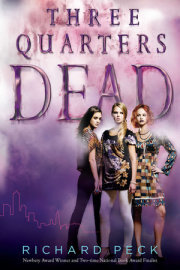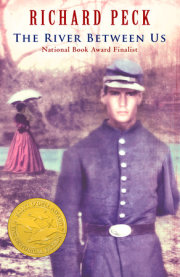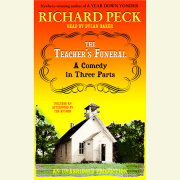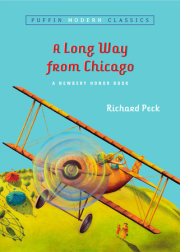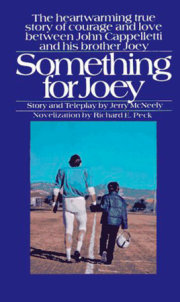“Oh no, the Titanic cannot sink.”
The ship shuddered and the hiss of steam ceased. Over the chorus of hundreds of far-off voices crying out, I heard music again, a mournful, stately melody now that broke as I listened, notes scattered to the wind.
The ship began to slide. It shook, and there were explosions deep within it. Boilers giving way, perhaps. Or the collapse of kitchen crockery. Or the great crystal chandeliers thundering down on parquet floors. The Titanic, her stern standing high out of the water, was sliding into the sea.
The water rose to meet me. I threw a leg over the rail and balanced there, watching the strange, rolling waterfall that surged beside the ship’s hull. I was not six feet above it. I leaped out into the maelstrom, and the water’s first icy blow knocked me senseless and stopped my breath.
Also by Richard Peck
NOVELS
Are You in the House Alone?
Bel-Air Bambi and the Mall Rats
Blossom Culp and the Sleep of Death
Close Enough to Touch
Don’t Look and It Won’t Hurt
The Dreadful Future of Blossom Culp
Dreamland Lake
Fair Weather
Father Figure
The Ghost Belonged to Me
Ghosts I Have Been
The Great Interactive Dream Machine
Here Lies the Librarian
The Last Safe Place on Earth
A Long Way from Chicago
Lost in Cyberspace
On the Wings of Heroes
Princess Ashley
Remembering the Good Times
Representing Super Doll
The River Between Us
A Season of Gifts
Secrets at Sea
Secrets of the Shopping Mall
Strays Like Us
The Teacher’s Funeral
Those Summer Girls I Never Met
Three-Quarters Dead
Through a Brief Darkness
Unfinished Portrait of Jessica
Voices After Midnight
A Year Down Yonder
NOVELS FOR ADULTS
Amanda/Miranda
London Holiday
New York Time
This Family of Women
SHORT STORIES
Past Perfect, Present Tense
PICTURE BOOK
Monster Night at Grandma’s House
NONFICTION
Anonymously Yours
Invitations to the World
AUTHOR’S NOTE
The books we read when we’re young follow us all through life. A book I found long ago—or maybe it found me—led after years to the book in your hand, Amanda Miranda.
In the summer of 1955 I was coming back from college in England. This was still the Golden Age of transatlantic ocean liners, and I was aboard the mighty Royal Mail Ship Queen Elizabeth.
I wandered into the ship’s library one blustery day at sea, and there was a copy of a new blockbusting bestseller. It was Walter Lord’s A Night to Remember. And so I settled down in a deck chair on the biggest, fastest, grandest ship afloat to read a minute-by-minute account of how the biggest, fastest, grandest ship of its day sank on its maiden voyage. The Titanic. I took it to heart. We were still three days from docking in New York.
A Night to Remember is a reminder that there’s more high drama in real life than in any fiction. Still, many years later when a publisher commissioned me to write a historical novel, I knew where I’d set the high moments of the story.
All fiction begins with research. I spent four years with the deck plan of the doomed Titanic pinned up on my writing room wall. I took three hundred pages of notes. After all, there were still some living survivors of this, the most famous disaster in history, and I wanted to get it right.
I added only two characters of my own to the passenger list. They are a young English lady, a knight’s daughter, and her maid. Amanda and Miranda are two young women on a collision course with one another even before a mountain of ice rises out of the sea to claim its victims.
In the years since I wrote Amanda Miranda, the remains of the storied Titanic have been found on the ocean’s floor. A landmark movie has been made with a theme song still played everywhere. And now, suddenly, it’s been a hundred years since the great ship went down.
This centennial edition of Amanda Miranda invites you back to a story inspired by all that high drama, and lost glory.
Table of Contents
PROLOGUE
The Wisewoman lived in the last soft fold of earth before the sea. Some said her rude cottage on the Isle of Wight was built from the stones of the ancients. Stones that once lay on Ashey Down in patterns that only the prehistoric priests could read.
But the folklore was false. The rough rock walls of the Wisewoman’s house had never been ancient altars, though they glowed gray with mystery in the hill twilights.
A century earlier the Wisewoman would have been burned as a witch. But the new twentieth century had dawned, bringing a breath of change even to this island, where once the old Queen Victoria had been happiest. But the small woman who had ruled an empire was gone. Her royal Osborne House, not ten miles from the Wisewoman’s garden gate, was sealed, and her century had slipped into history.
Smoke from the long liners to America blackened the horizon. Their tall prows knifed out of Southampton port across the narrow water called The Solent to conquer the ice-strewn Atlantic. The world beyond this tiny island that clung to England seemed to stir, sending a ripple of anticipation back across the crouching velvet hills.
And so the Wisewoman wasn’t burned or hounded out of her home. She was allowed to live, though not in peace. For she figured in the nightmares of all the local children, and they in hers. By day they dared one another to advance on her cottage. When they supposed that dusk hid them, the bolder ones crept through the Wisewoman’s tangled garden and threw small stones at her roof. Often enough she spied them from her crooked window: a dozen urchin faces, pale as cabbages sprouting down her garden rows.
But the Wisewoman was not easily frightened. First and last, she was a businesswoman and the least superstitious soul on the Isle of Wight. She turned a handy profit in the herbs and roots that any cottager might raise in a shady dooryard garden. And she harvested her crops by moonlight only because her customers expected it of her.
As a brewer of home remedies, the Wisewoman was not remarkable. What she could do really well was to foretell the future. More than once she had foreseen in a lovesick lad, creeping to her door for a love potion, the precise moment of his death, though it be forty years in his future.
Once a gaggle of young girls dared each other up the Wisewoman’s flagstone path, intent on having their fortunes told. Instead of being assailed by the fumes of a witch’s brew, the girls were settled in a row on a bench and offered tea in thin china cups. They soon went their way, none the wiser about their futures. It was the Wisewoman’s plan, for she saw early death clinging to the oldest child and would neither lie to her nor frighten her.
There was, the Wisewoman reasoned, no market for this sort of knowledge. Therefore she never turned a profit from prophecy. Only once, startled by a stranger at her door, did she break silence to speak in baffling language of the young woman’s future.
1
Rattling down Nansen Hill, the wagon driven by Josiah Cooke grazed the railing on Dunnose Bridge. The old plow horse staggered but strained on, over the hump of the bridge into the easier dust of the road. But the rusting linchpin on the rear wheel had worked loose. Twenty paces on, it fell free, and the wagon collapsed.
Josiah was pitched off his high perch and sent sprawling across the horse’s broad rump. His wife shrieked once, and two shapeless legs in much-mended black stockings flailed the air as she slipped sideways into a mound of bright wildflowers. Mary Cooke, wedged between her parents, slid more slowly to earth and joined her mother.
They were a hardy trio, no strangers to trouble. Mrs. Cooke leaped to her feet, adjusting her black skirts—and Mary’s. Josiah untangled himself from the hind legs of the horse and gazed without hope at the wagon, the only thing he owned outright in the world, sagging half in the ditch.
Their only luck was that they were in sight of Bonchurch, on the seaward side of the island. Josiah Cooke trudged off toward the village in search of a wagonman who might spare him a mallet and a linchpin. Mrs. Cooke settled against the flowery bank and gave way to her usual complaints. There was hardly a hint of autumn in the breeze blowing up from the Channel. Still, she pulled her shawl up to her eyes.
“Stand back from the road where you won’t be seen, Mary!” she barked. “Then tuck up your skirts, you simple baggage! How will it look to arrive at your first job grass stained? Though at this rate we’ll never see Nettlecombe this day, and then where will you be, I should like to know.”
Mary Cooke gladly withdrew from her mother. She strolled into the field, her skirts held above her shoe tops, though no strangers were passing on the road to be inflamed by her beauty. Because she never answered back, she didn’t mention that even on foot they could reach Nettlecombe before dark. Then Mary would have the opportunity to exchange one bondage for another.
She walked with quickening steps across the unmown grass until her mother’s whining voice was lost in the Channel winds. A sudden gust tugged at Mary’s black hair, anchored in a severe knot. Had she dared, she would have raced against the wind until she was in sight of the sea. Instead, she wandered with her thoughts.
Mary Cooke had lived all her eighteen years at Whitely Bank, the farmers’ village that stands where the roads to Shanklin and Ventnor cross. Both these rough roads lead finally to the sea, and she had forever felt the restless tides stirring inside herself. But she’d never more than glimpsed the green-gold waves that scalloped the beaches of the seaside towns. And it wasn’t the carnival atmosphere of the resort towns Mary dreamed of. She’d been reared to shun pleasure. It was the restless, rolling sea itself that flooded her dreams, sometimes beckoning her to destruction, sometimes to new life. But always its call led her far away. Always.
She wandered on in the September stillness. For when her mother and father delivered her to Nettlecombe, these drifting moments would surely end.
To fulfill her mother’s plan, Mary Cooke was to go into service for the Whitwell family, whose estate stretched west from Nettlecombe. Mrs. Cooke had trained Mary for her lifetime of service as other girls were prepared for their wedding days. “Someday,” her mother would say in a voice grown strangely soft, “you will serve a great family in a fine house.”
And so in the cramped cottage where Josiah Cooke sheltered his small family, Mary was taught to serve. She learned to set a proper table, and to carry a heavy tray and open a thick door with her free hand, at an age when other girls were too awkward to cross a threshold without sprawling.
And she’d learned silence. To speak of the rebellion that often welled in her throat was unthinkable. But there was little silence in the Cooke household. Mrs. Cooke filled the empty evenings with her endless memories. She had been in service herself, across the water in Hampshire, before marrying a bumpkin who’d buried her at Whitely Bank.
She’d been driven from the proud panorama of a great country house where she was trusted everywhere, from drawing room to attics. Where she took her tea with the governess and the housekeeper themselves. Where her lady called her “my treasure” as she turned back the swansdown sheets.
She had left the rustle of gray silk for the manure-stained tatters of a farmer’s wife. All she could hope for now was to create in Mary a servant who might nearly rival herself. There was justice in this, Mrs. Cooke was certain. For Mary was the unwanted child whose coming had forced her to leave her lady’s house in hasty disgrace.
“Never,” Mrs. Cooke would say at the end of an evening, “never turn your back upon your betters. . . . Always keep your eyes down. . . . Speak clearly when they find it necessary to speak to you. . . . Note their every need.”
Mary had been allowed a little schooling, for her mother knew the value of a well-spoken servant. She had learned to read, to write a clear hand, and to add the figures of a household account. She had heard poetry for the first time and was haunted by her teacher’s mournful chanting of the verses:
Alone, alone, all, all alone,
Alone on a wide, wide sea!
And Mary had learned to speak in a tone respectful enough to suit the persons of quality, the gods and goddesses she was being shaped to serve.
Now the Whitwells of Nettlecombe were to receive a new servant. Whether Mary would find her place scouring the roasting pans or dressing the young lady of that house depended very much on the impression she made at the outset.
* * *
As she drifted farther from the broken wagon, Mary slipped free of all her hard-learned lessons. She climbed a stile and started up a fold of earth where the tang of salt air grew sharper. She might have appeared to be running away. But there was no place to go. She was at the Wisewoman’s cottage before she realized it. The little stone house rose half out of the earth before her eyes. As she noticed the door, it opened.
The Wisewoman could tell at first glance that she was not being visited by a client. And she favored the young girl in the shapeless dress with a formal nod that none of her clients ever got from her.
“I meant no harm. I was only passing,” Mary stammered from the front gate. But the quiet tones she’d learned were lost in the singing sea wind.
The Wisewoman nodded again and swept her hand back to the open door, inviting her in. Uncertainly Mary walked up the stepping-stones of a dooryard overgrown with red chickweed.
“You have lost your way, perhaps.”
Confused by kindness, Mary only stared at the old woman, whose neck was webbed with wrinkles as fine as ivory lace. The very old woman and the very young one found each other beautiful in a wordless moment. “Lost or certain of your course,” the Wisewoman said at last, “come and rest yourself.”
To be received like this was beyond Mary’s experience. The old woman had to gesture twice before Mary would sit in her presence.
More like a cool cave than a parlor, the cottage’s only room served as the Wisewoman’s kitchen and pharmacy. Mary’s eyes roamed the apothecary bottles lining the walls. Above, the rafters were hung with bunches of drying herbs and heather, pale silver and paler lavender. She wondered at their uses.
The Wisewoman placed a gold-rimmed cup of black tea in the girl’s hand. She allowed the silence to lengthen while astonishing images of Mary’s future played across her inner eye.
At last, bested by curiosity, Mary asked, “Is this a chemist shop, my lady?”
The question brought the old woman back to earth. She paused a moment, choosing the words to describe her livelihood. “In a manner of speaking. Here there is folk medicine for those who mistrust doctors even more than they mistrust me. But why do you call me ‘my lady’?”
Mary went pale with shame. “I—I was taught it was proper.”
“You are a servant?” The Wisewoman was amazed, for her visions of the girl’s future foretold otherwise.
“By nightfall I shall be,” Mary said softly. “At Nettlecombe.”
“A servant speaks as you have done only where she is employed. You are not servant to all the world.”
The idea, though meant kindly, was strange to Mary, almost meaningless.
“And you will serve until you marry?”
“I—I think I shall never marry, for my mother said—”
“Oh yes! You shall marry twice,” said the Wisewoman. She’d been startled into telling the truth she’d foreseen.
Mary thought her mistaken, even though the old woman’s knowledge hung heavily about them in this place.
“I can divine the future,” the woman explained. “It is an uncertain gift, and I take no credit for it, nor any pay.”
“And can you see more about my future?” asked Mary.
After a silence an answer of sorts came. “I am addled by it—and by you. Your future lies a great deal farther off than Nettlecombe. It lies beyond a mountain of ice, where you will die and live again. I see you in a world so strange and distant that the images seem the trickery of a Gypsy’s false promises, even to me.”
She broke off then, and the two sat motionless until the mantel clock struck noon. As if she’d heard her mother’s far-off cry, Mary rose. But at the cottage door the Wisewoman motioned her to wait while she disappeared back into the gloom. Returning, she pressed a cold disc into Mary’s hand. “It is for you,” said the woman, who had never given a gift. “Though it has no magic powers, I believe it should belong to you.”
Mary stared down at a coin—foreign but not old. There was the face of some copper savage in worn relief on it. “I found it on the beach one day,” the Wisewoman said. “There were other things scattered in the sand, perhaps from a shipwreck. An American ship, I shouldn’t wonder, for it’s an American coin. Take it back.”
Out in the sunshine, Mary turned just as the Wisewoman was closing the door. “When shall I meet the men I shall marry?” she asked, too shamed at her boldness to look up.
“Why, tonight, of course. Both of them.” And then, as the Wisewoman watched Mary moving quickly away across the flagstones, almost in flight, she said, “Goodbye . . . Amanda.”
But the Channel winds swept the name far out to sea.
* * *
A double row of black Italian pines threw long afternoon shadows across the approach to Whitwell Hall. In the great square salon where Lady Eleanor sat with the female members of her house party, the lamps were already lit.
The ladies lingered over their tea, balancing the cups on silken knees, brushing a crumb of tea cake from the folds of their afternoon dresses. Conversation drifted in the last moments before they would have to go up and begin dressing for dinner. If one of them had risen from her chair and glanced out of the long window, she might have noted the Cookes’ crippled wagon being dragged over the gravel drive behind the ponderous horse.
The house glowing at the top of the rise seemed vast to Mary, as if an entire village had been gathered neatly under a single roof. Even Mrs. Cooke caught her breath at its magnificence. To cover her awe, she barked at her husband, “Look sharp for a turning to the back of the house, Josiah! Have you no more sense than to fetch up at the front door?”
To Mary she said nothing. She’d left the red marks of her fingers across her daughter’s cheek when the shiftless girl had finally returned from her noontime wandering.
The tall columns of the front portico loomed above them before Josiah found the tradesmen’s lane forking to one side. It was hardly more than a slit in the high boxwood, and at once they were swallowed in the near night of the hedgerows. At the end the narrow way widened to a paved yard between the kitchen wing and a jumble of outbuildings. If Josiah’s ancient horse had been more alert, it would have shied at a motionless figure standing just off the lane in a gap between hedge and stables.
John Thorne had stood for some time while the shadows crept over him, darkening all but the glints in his straw-blond hair. Only his hands moved as he rubbed with a rag at the grease embedded in his calloused palms. His mind was elsewhere. He stared up at a pair of windows high in the great house, far above the servants’ domain. He’d watched reflected sunset wash them red, then purple. And still he stood until another servant would draw the curtains of Miss Amanda Whitwell’s room.
The young man had spent the day demolishing the old barn doors on the stable wing. Tomorrow meant hanging the new modern doors he’d paneled himself. The stables were being refitted for the Whitwells’ new motorcar. No favorite in the servants’ hall, John Thorne was a valuable craftsman who repaired and maintained Whitwell Hall as if every splinter and stone were his own. Now he was to be promoted to chauffeur-mechanic when the new car arrived.
His territory ceased at the kitchen yard. But it stretched back to the outbuildings and the pastures of the home farm to the distant cottage in the grove. He’d been born there before the Whitwells had come.
Just as the curtains on Amanda Whitwell’s window were drawn by the invisible hands of one Mrs. Buckle, the Cookes’ wagon crunched past the motionless man. Something came over Mary then. Something made her glance back. But she saw only the shadow of a man.
The quiet grounds gave no hint of the bustle inside the house as the dinner hour approached. In the dining room a pair of gaitered footmen, hired for the occasion, hovered over a table set for twenty-four in a blaze of silver and French crystal.
The fanning door to the serving pantry suggested the storm brewing below stairs. The serving maids, Hilda and Hannah and Betty, in caps like overstarched toadstools, rustled past one another.
Below, Mrs. Creeth, the cook and empress of the kitchen, was locking horns—not for the first time—with Mrs. Buckle, the housekeeper, whose influence ceased at the door between family and staff. But Mrs. Buckle, whose accents grew hideously refined in her encounters with the lesser servants, had invaded enemy territory at its busiest hour. Now she and Mrs. Creeth stood, each gripping a handle of the same silver tray.
“Give it over, if you please, Mrs. Buckle!” Mrs. Creeth shrieked. “There’ll be no catering to imaginary invalids until Sir Timothy and Lady Eleanor’s guests have ate and drunk their fill!”
White with rage, Mrs. Buckle twisted the tray from the cook’s grasp. It swung down to rap her own bony knees. “I haven’t any intention of disrupting your culinary efforts,” she said, “for I know how very difficult it is for you, Mrs. Creeth, to manage even an ordinary dinner . . . at your age.”
The words fell on Mrs. Creeth like an ether-soaked rag. She fell back, and Mrs. Buckle swept past her to the stove, where she began to coddle an egg and toast a slice of bread for Amanda Whitwell.
Arranging the bland meal on the elaborate tray, the housekeeper sighed. “Poor Miss Amanda, who has hardly known a well day in all her young life. Who would care for her few needs if not her dear old Buckle, who was nurse and nanny to her.”
“Just how sick is Miss Amanda this time?” the cook demanded.
But this rude intrusion was ignored. With maddening calm, Mrs. Buckle turned to Mrs. Creeth and said, “Would you be good enough to locate a silver vase and one perfect rosebud before I take this tray upstairs?”
Mrs. Creeth’s lips parted dangerously. But there was a knock at the outside door. Whirling, Mrs. Creeth howled at Betty. “You, girl! See who’s at the door!”
Betty made a careful circle around the two women and pulled the door open. There stood Mrs. Cooke and Mary, who carried a small wicker satchel.
Mrs. Cooke took in the scene at a glance. “Where is Mr. Finley?” she demanded in a ringing voice.
At that moment the mighty Mr. Finley, butler above and dictator below, entered. He noted that Mrs. Creeth and Mrs. Buckle were standing nearer one another than was good for either of them. “Ah, Mrs. Cooke, is it not?” he said, advancing to the door.
Mary longed to run then, back to the wagon and her father. But Mr. Finley never glanced at her. He was saying to her mother, “I see you have brought the girl. She is sensible and literate, is she not?”
Mary noticed that Mr. Finley’s left nostril vibrated as if it detected a repulsive odor, while the other refused to become involved.
“She is,” Mrs. Cooke hastened to say, “trained by me, who once personally attended Lady—”
“Yes, yes, I have no doubt. You have provided her with aprons in good repair and one suitable costume for her afternoon off, if she is granted one?”
“I have,” Mrs. Cooke vowed. “The very aprons I myself—”
. All rights reserved. No part of this excerpt may be reproduced or reprinted without permission in writing from the publisher.



